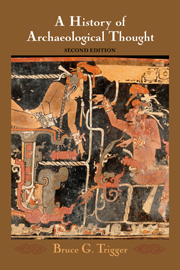Book contents
- Frontmatter
- Contents
- LIST OF ILLUSTRATIONS
- PREFACE TO THE SECOND EDITION
- 1 Studying the History of Archaeology
- 2 Classical and Other Text-Based Archaeologies
- 3 Antiquarianism without Texts
- 4 The Beginnings of Prehistoric Archaeology
- 5 Evolutionary Archaeology
- 6 Culture-Historical Archaeology
- 7 Early Functional-Processual Archaeology
- 8 Processualism and Postprocessualism
- 9 Pragmatic Synthesis
- 10 The Relevance of Archaeology
- BIBLIOGRAPHICAL ESSAY
- REFERENCES
- INDEX
10 - The Relevance of Archaeology
Published online by Cambridge University Press: 05 June 2014
- Frontmatter
- Contents
- LIST OF ILLUSTRATIONS
- PREFACE TO THE SECOND EDITION
- 1 Studying the History of Archaeology
- 2 Classical and Other Text-Based Archaeologies
- 3 Antiquarianism without Texts
- 4 The Beginnings of Prehistoric Archaeology
- 5 Evolutionary Archaeology
- 6 Culture-Historical Archaeology
- 7 Early Functional-Processual Archaeology
- 8 Processualism and Postprocessualism
- 9 Pragmatic Synthesis
- 10 The Relevance of Archaeology
- BIBLIOGRAPHICAL ESSAY
- REFERENCES
- INDEX
Summary
The test of any good idea in archaeology, whatever its source, is whether it helps archaeologists look for things in the archaeological record that they might otherwise overlook or underrate.
john e. terrell, “Archaeological Inference and Ethnographic Analogies” (2003), p. 74In this concluding chapter, I will review some general theoretical challenges facing archaeology and consider how archaeologists might respond more effectively to these problems in the future. I also will discuss briefly the special roles that archaeology can play within the social sciences and in modern society.
The Challenge of Relativism
Because archaeology deals with complex phenomena and is not an experimental discipline, it is particularly vulnerable to what is accepted as true being whatever seems to be most reasonable to archaeologists, both individually and collectively. Archaeologists may establish sound correlations, weed out logical inconsistencies, and demonstrate that accepted interpretations do not accord with new data. Yet this historical survey reveals that, even if archaeology has grown considerably more resistant to subjectivity as its database and techniques for studying these data have expanded, interpretations are still subtly influenced by social, personal, and disciplinary perceptions of reality that often preclude an awareness of the full range of alternative explanations that require testing. In many cases, neither sufficient data nor strong enough correlations among the variables being examined are available to counteract these biases.
- Type
- Chapter
- Information
- A History of Archaeological Thought , pp. 529 - 548Publisher: Cambridge University PressPrint publication year: 2006



